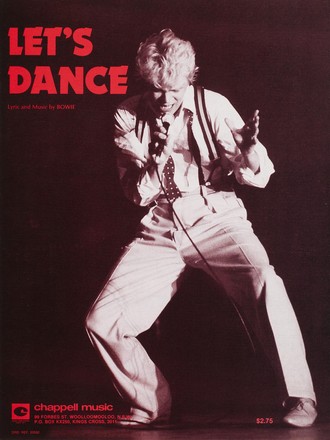
Let’s Dance sheet music
Let’s Dance sheet music,
lyrics and music by David Bowie, c 1983
Jones Music,
Woolloomoolloo (NSW), photograph by Denis O’Regan
MUSIC FILE/BOW
Acquired September
1983
BOWIE DOWN UNDER
Let’s Dance is a song about dancing with a lover and tells the story of a young Indigenous Australian couple’s struggle with assimilation. Written and performed by UK cult-hero David Bowie, it was the singer’s fastest selling single to date and his only transatlantic No. 1 hit. Bowie was an early pioneer of music video and these clips as little movies, stating that ‘some movies can have a point…so why not try to make some point…all over the world’. Determined to use his music videos as a platform for social observation, Bowie devised the Let’s Dance clip as a direct statement against racism and oppression. Filmed on location in Sydney and outback NSW, in March-April 1983, this music video provided one of the few instances for contemporary urban Indigenous Australians to be seen on global television by mainstream audiences.


 Back to list
Back to list